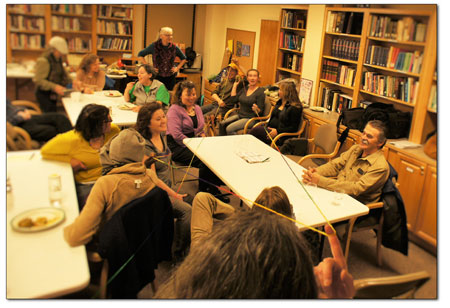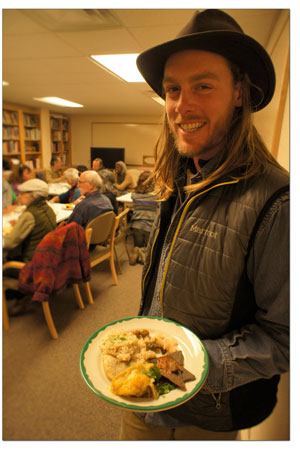
Ana Zeiler’s finger (foreground) holds a string that HELP members tossed around the room as folks spouted requests for help and offers to assist. The local time-banking organization held a new sign-up/potluck recently at St. Mark’s Church. Holding the string at the back of the room is new recruit Micah Rieke. "I need to just meet people that I can have faith and trust in" he said, as laughs and cheers rose toward the church upstairs./Photo by Joy Martin
HELP is on the way
Community caution: your neighbor might offer you a hand
You offer to pay a stranger, say, Bob the Handyman (you met him on the internet), to come to your house to fix your stove. Lo and behold, he doesn’t want you to give him any money. Rather he wants you to pay him by means other than financial ones. Sounds fishy, unsafe and entirely too invasive. Right?
Don’t call the cops. Bob might be onto something.
What if you paid Bob in a commodity that we all (in theory) share equally? What if you paid him in time?
“We’re not trading services; we’re trading hours,” Elizabeth Anderson, co-founder of Durango’s newest time banking service, Hour Exchange La Plata (HELP), explains.
“We trade in time because our time is all the same, so the government can’t tax it,” her husband and one of HELP’s other founders, Eric Nylund, says. “All hours are created equal.”
To get involvedUpcoming HELP intro talks and potlucks |
This legal, nontaxable business model is La Plata County’s fourth attempt at time banking, a method of trading time between individuals through skills, knowledge and other resources.
The only money exchanged happens at the beginning of the membership with a suggested $25 donation.
“We are not nonprofit, so we can’t even say ‘fee’ or ‘due;’ it’s a donation. People are welcome to make it or not,” Anderson cautiously invites. “It’s kind of an act of faith. Giving a little money says you want to be involved.”
In Bob’s case, for example, he banks two hours for fixing your stove. Maybe you can’t directly help Bob by painting his house, so you pay him with the hours you accumulated from watering Mary’s plants while she was out of town. You’re paid by the hours Mary earned from loaning her table saw to Michael, who earns hours by teaching Marky Mark how to sing. Marky Mark pays for his singing classes by helping paint Bob’s house.
The Time and Talents software system, designed specifically for time banking, keeps track of member hours, showcases the services available (“offers”) and helps connect people with services needed (“requests”).
“We’re so used to calling someone up, paying them money to fix something and then having them go away. With that kind of structure, we don’t have to establish relationships with people,” continues Anderson.
With the assistance of Ana Zeiler, Lynn Deemer and Jackie Morlan, Anderson and Nylund launched HELP in early 2014, convinced that a Durango-Bayfield time bank was the next best thing for the community.
Later in the year, they attended a training seminar in Denver led by hOur World, an international time banking organization that boasts 27,741 members, 438 communities and nearly 1.5 million hours of service, according to www.hourworld.org.
Other branches exist in Pagosa and Montrose. Time Bank of the Rockies, Montrose’s branch, also serves Telluride, Ridgway, Ouray and Delta and is about a year ahead of HELP. But, according to Anderson, “We’re right on track with signups.”
HELP currently has 100 members ranging in age 4 from 21 to 81.
“It doesn’t matter if you’ve just graduated from high school or retired from a profession. You might even have a business you’re trying to get going,” says Anderson.
Twenty-two members signed up through Becky Clausen’s Senior Seminar last semester at Fort Lewis College in a course that will eventually be called “Sociological Imagination.” Clausen’s class, inspired by something she read in the Durango Telegraph in August, was, in Clausen’s words, “a workshop for moving toward a vision of an alternative society.”
“I challenged them to think real broadly about the underlying roots of social problems and then what some alternatives could be to address those things,” Clausen explains. “It was really just an experiment in trust building.”
Trust ended up being the No. 1 reason students bristled at the thought of trading labor not for wage.
“It’s how we’ve been socialized into thinking money and wages are how you get stuff done. It’s a good exercise to think about labor differently,” Clausen offers.
After paying their negotiated student donation, seniors were given an orientation by Anderson and Nylund on how to use the Time and Talents software before signing up for at least one transaction. After participating in their trades, which ranged from wood cutting to cheffing up gourmet meals, they each wrote a reflection on what worked and what didn’t.
 Hungry farmer Jeremy Kester, 28, recently moved to Durango from the Southeast to work at the Turtle Lake Community Farm. A new HELP member, he says he’s excited to partake in more than just generous potluck dinners./Photo by Joy Martin |
“A lot of the students felt that in theory time banking is a great practice. But this project really highlighted the social structural challenges, like how we view our neighbors or people in our community,” says Clausen.
“Having interactions all online is a bit dehumanizing, so some kind of face-to-face time is a really great strategy,” insists Clausen, who participated in the project by inviting a couple of students into her home to teach them how to make applesauce.
And so building trust with other members is encouraged through social events such as potlucks.
“Normally, I’m one of the oldest people in the time bank, and this time I’m one of the youngest,” says 29-year-old Bagheera Latimer, as she works wool through the spinning machine she brought to St. Mark’s Episcopal Church last Wednesday night for a HELP potluck dinner.
Latimer believes HELP is different from the previous time banks in La Plata County because now “there’s a real focus on community.”
“People are offering real community connections. Previously, they focused on running cool and nifty doo-dads, but it’s not about trading nifty tricks,” explains Latimer, a current HELP committee member.
Community doo-dads don’t resonate with everyone in the group though.
“I’m not as community oriented as the younger group and I’m not normally one to go to a potluck, but I’m willing to do it to support (HELP),” laughs Robert Lea, a retired general contractor and newer HELP member.
Like Latimer, he feels his age is a bit off the norm for HELP.
“I’m different from the other members,” says Lea. “First of all, I’m older than dirt. And second of all, I have hard skills to offer. There’s quite a bit of holistic health and languages and communication and putting on parties and gardening and cooking – more of those skills and not as many of the harder skills. I’m not making any judgments but more people need what I can offer.”
Because Lea is one of those “figure out how to make do with what’s already there” mechanically inclined kind of guys, he gets a lot of requests from HELP members and has banked 41 hours in the last four months.
“My advantage is when I do something, I do it all the way. I’m not going to put my toe in the water, I’m going to jump in.”
His advice to new members and those thinking of signing up is simple. “It’s not just what you like to do; it’s what can you do for others. Some people have trouble understanding what it is they can do for others. Have a goal in mind and then reach out to the list for requests and offers.”
Folks hesitate signing up for a time bank because, ironically, they think they just don’t have enough time.
“It’s so odd to think of exchanging time and having that time be equal,” says Anderson. “There needs to be shift in thought: as in, how do you plan projects so somebody else can help you save time?”
Lea agrees. “There’s only so much time,” he says. “I just try to stay busy so I don’t slide into my grave too early.”
For more on Hour Exchange La Plata County, go to www.helptimebank.com
In this week's issue...
- December 18, 2025
- Let it snow
Although ski areas across the West have taken a hit, there’s still hope
- December 18, 2025
- Look, but don't take
Lessons in pottery theft – and remorse – from SW Colorado
- December 11, 2025
- Big plans
Whole Foods, 270 apartments could be coming to Durango Mall parcel
